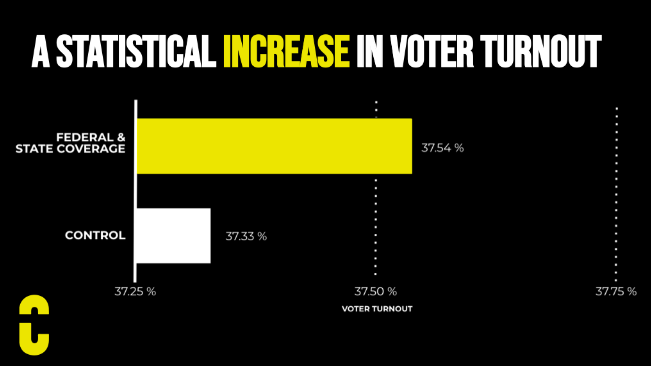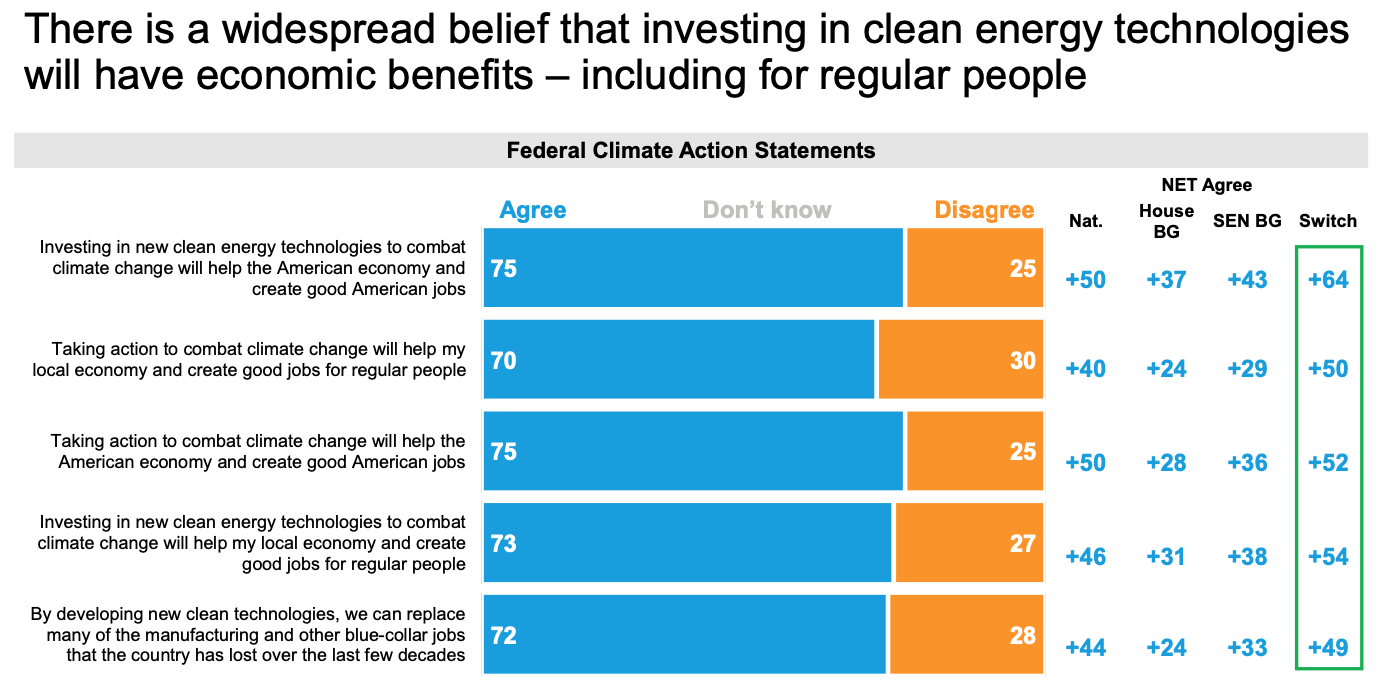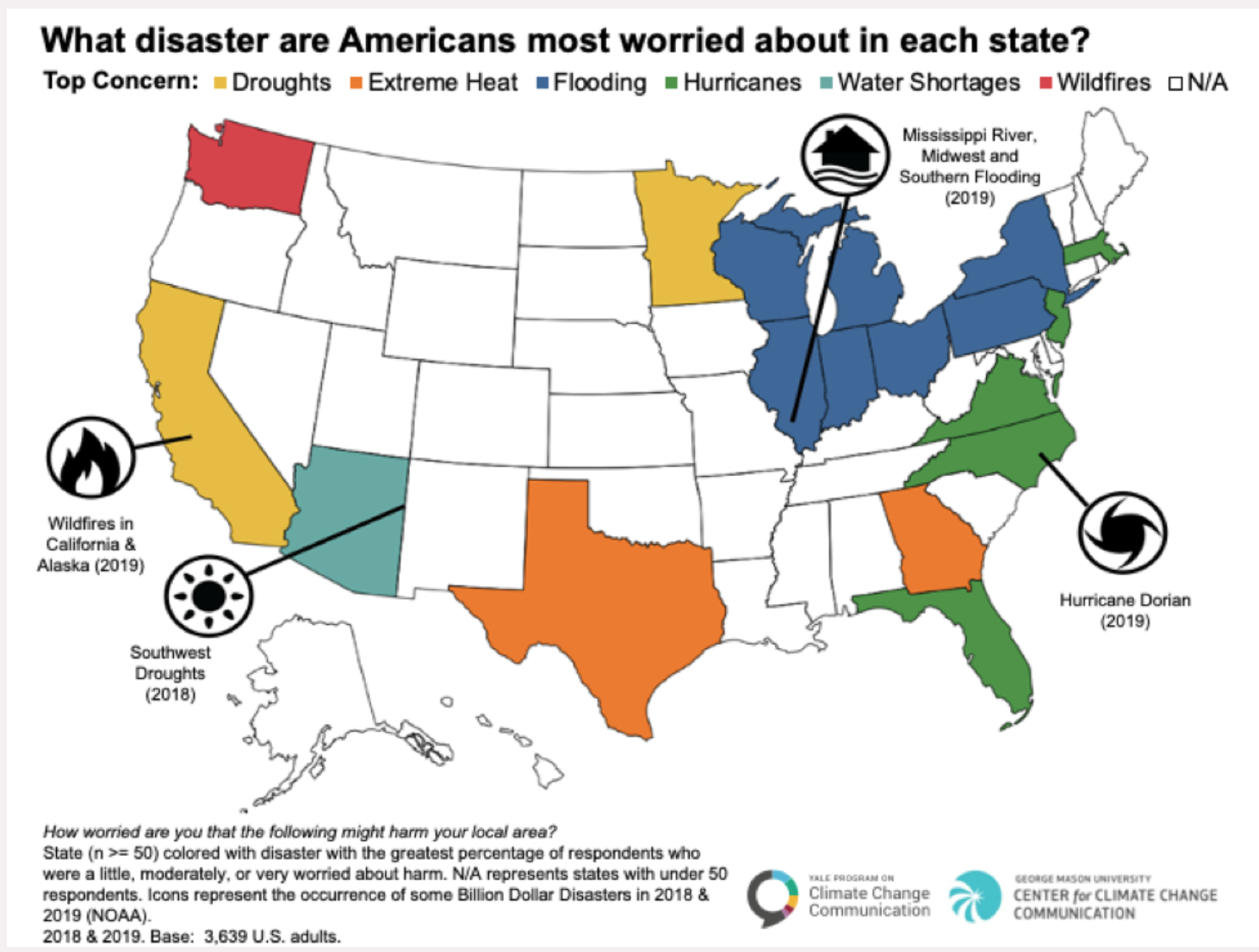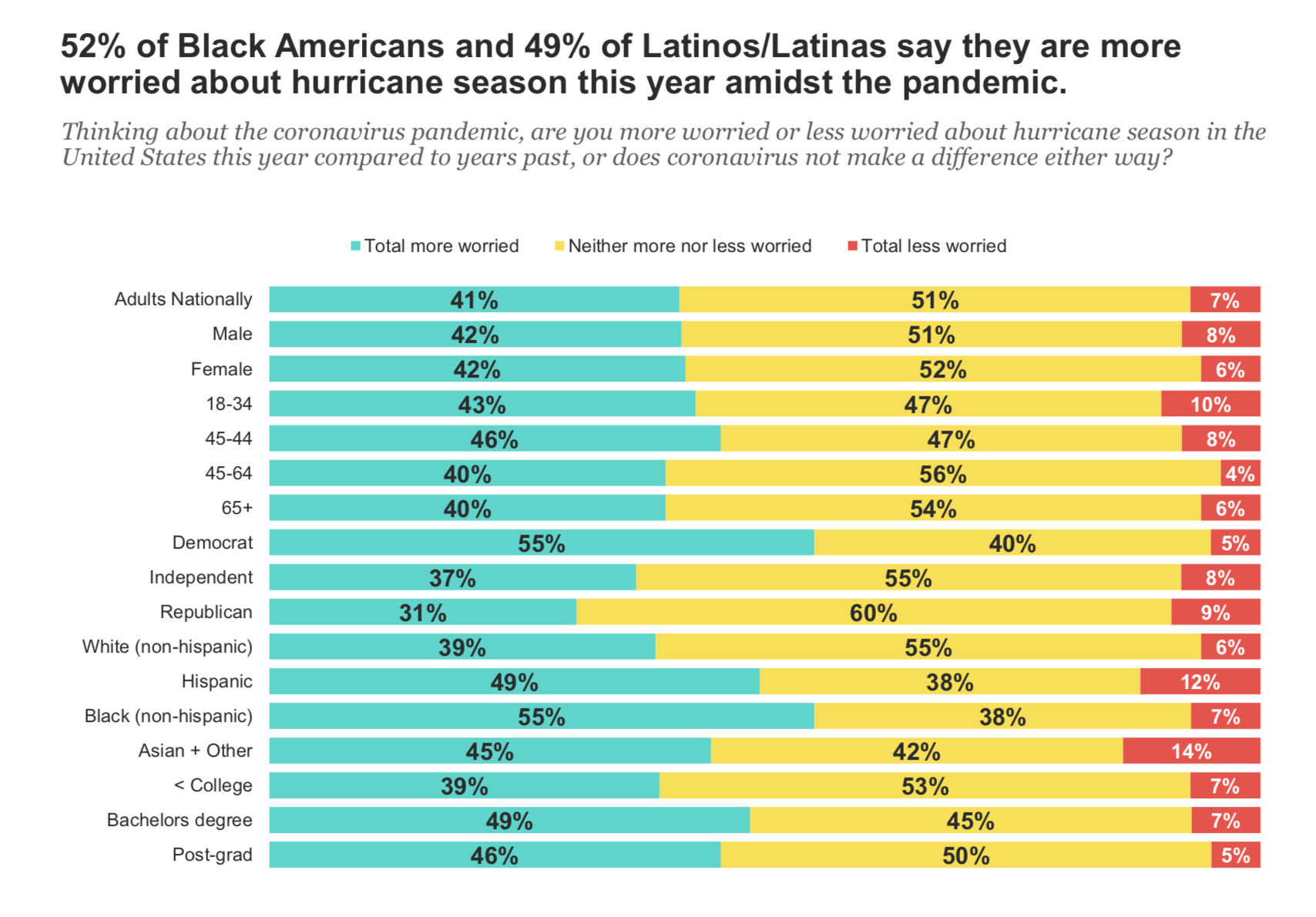Resources
Search below for resources covering the intersection of climate engagement, social science and data analytics.
RESULTS
Poll: Rural voters may be swingable
While partisanship remains strong among the rural electorate, more than one-third (37%) of rural voters appear "swingable" in future elections, depending on resonant policy proposals and messaging. Three messaging points — lowering prices; bringing good-paying jobs to local communities; and a populist message focused on corporate greed — received such broad support that they rivaled voters’ agreement on core values like family and freedom. Read additional analysis in the Daily Yonder's coverage.
Environmental Polling Roundup - July 29th, 2022
This post includes climate and environment headlines, data points, and key takeaways from recent public polls - including new polling on voters’ reactions to arguments from the two parties on climate change; the impact of climate change and the environment on battleground voters’ decisions in the upcoming midterms; an experiment in communicating about human-caused climate change using a “heat-trapping blanket” metaphor; Americans’ personal experiences with climate change; and the widening generational gap in Republicans’ environmental attitudes.
Case Study: COURIER’s Model Boosts Voter Turnout
Delivering more political information to voters makes them vote more. COURIER’s unique method of boosting news on social media had a positive, statistically significant impact on voter turnout in the 2021 Virginia state election. There were two kinds of news tested on voters: local coverage of the Virginia 2021 gubernatorial race and candidates and localized coverage of federal policy solutions. These kinds of localized political news increased voter turnout by 0.2%. This experiment was tested on a pool of roughly 1 million Virginia voters on social media from September to November, 2021.
Sparking Imagination: A Proof of Concept
This Lab-supported interactive research project contributes to the knowledge-base of cultural and creative organizing in the context of Hip Hop Caucus' Think 100% Hampton Roads Organizing Project, which began with the goal of using comedy and cultural events to help mobilize Millennial and Gen Z Black voters in the Hampton Roads region for the 2019 statewide elections in Virginia, with voters being informed by the need for climate justice, equitable solutions for the climate crisis, and the protection of Black communities from flooding.
It seeks to share the processes, experiences, wisdom, and “grows” and “glows” of this ongoing organizing project with those working for climate justice through creative and cultural organizing in the spirit of creating and sharing knowledge and cultures that serve collective futures. The author hopes the wisdom and lessons found here will help others use creative and cultural organizing strategies to help cultivate the power of the people, shift cultures, and foster the re-imagining of the narratives on which communities and what solutions should be centered within the movement for climate justice.
POLL: Majority of voters in Rep. Abigail Spanberger’s district support ‘Build Back Better’ plan, especially climate, clean energy provisions
The Build Back Better plan has majority support in key congressional swing districts, and ‘polluters pay’ laws and renewable energy investments are especially popular. These district-specific polls show that the Build Back Better plan has majority support in two very tough Democratic-held congressional districts. After reading a brief description that outlines the price tag and major provisions, Rep. Carolyn Bourdeaux’s constituents in GA-07 support the plan by a 54%-44% margin and Rep. Abigail Spanberger’s constituents in VA-07 support it by a 53%-44% margin. Specific clean energy provisions poll even higher, as voters in GA-07 support measures to accelerate the adoption of renewable energy by a 64%-33% margin and voters in VA-07 support these measures by a 62%-34% margin. One finding from these polls that is broadly applicable regardless of the location you focus on is the salience of corporate accountability on climate change. When presented with the idea of reinstating ‘polluters pay’ laws to “require corporate polluters to fund the clean up of their industry’s toxic pollution and set a fee on oil and gas companies that emit methane,” voters back the idea by overwhelming margins in both GA-07 (72% support / 26% oppose) and VA-07 (68% support / 27% oppose).
Poll: Voters Strongly Back Climate-related Infrastructure Investments
Survey data from 19 competitive House districts across the US revealed strong support (59%), across party lines, for the American Jobs Plan. Notably, the provisions that would address the climate crisis garnered even stronger support than the overall infrastructure plan did.
Among the specific provisions designed to address the climate crisis:
- 82% of voters support investments to rebuild roads and bridges and modernize public transportation to ensure it is cleaner and able to serve more people.
- 81% of voters support overhauling our country’s drinking water infrastructure.
- 70% of voters support addressing the challenge of climate change by shifting to greater use of clean energy, reducing carbon pollution from vehicles and industry, and making homes and buildings more energy efficient.
- 69% of voters support investments in clean energy such as wind and solar power by extending tax credits to spur innovation and manufacturing.
- 61% of voters support investments in electric vehicles and charging stations to reduce pollution and help more Americans buy clean cars.
Poll: Investing in American Clean Energy to Build the Industries of the Future
Key findings of a survey (phone and online) of US voters, with oversamples in key states include:
- Voters across the political spectrum overwhelmingly support government investments in clean energy technologies in order to rebuild the economy (77%), create good jobs (76%), and eliminate the carbon emissions that cause climate change (75%).
- There's a widespread belief (75%) that investing in clean energy technologies will have economic benefits – including for "regular people."
- And also that by developing new clean technologies, we can replace many of the manufacturing and other blue-collar jobs that the country has lost over the last few decades (72%)
- Strong support for various approaches to boost and develop specific clean energy technologies such as clean steel and cement, clean jet fuels, and energy storage and transmission.
- Voters support investing $75 billion in clean energy tech RD&D as part of the upcoming infrastructure bill.
How does the American public perceive climate disasters?
Different parts of the country see various kinds of extreme weather as most concerning, perceptions which are largely in line with actual major disasters that have occurred in those regions. This report provides concern profiles for the 18 largest states, drawing on survey data from 2018 and 2019. Over half of Americans see such extreme weather events posting a high or moderate risk to their community in the coming decade, and two thirds see a climate link to US weather (though only a third think climate affects our weather "a lot").
Poll: In time of COVID, two-thirds of Americans want climate action
Americans are worried about "triple threat" of hurricanes, COVID, & climate change. 52% of Black Americans and 49% of Latinos/Latinas say they are more worried about hurricane season this year amidst the pandemic. Half of adults in southeastern coastal states say they are more worried about hurricane season this year and 66% say addressing climate change should be a priority.
Poll: Americans on Clean Power
3 in 4 respondents said that it is a high priority to cut air pollution from energy production that has negative public health effects, including a slight majority of Republicans and 90% of Democrats. 7 in 10 said it is a high priority to reduce greenhouse gases from energy production, including just under half of Republicans and 91% of Democrats. After a briefing and assessment of arguments pro and con, 7 in 10 approved of the US participating in the Paris Climate Agreement.
Pagination
- Page 1
- Next page





